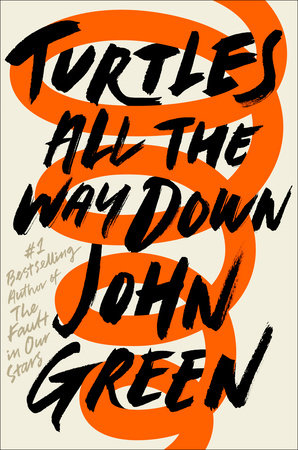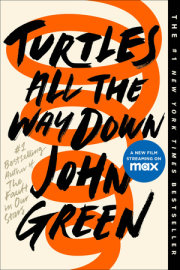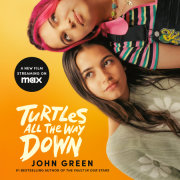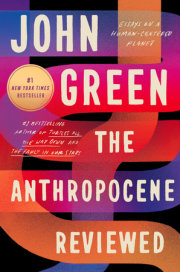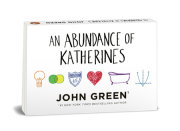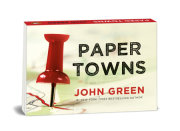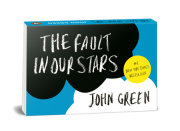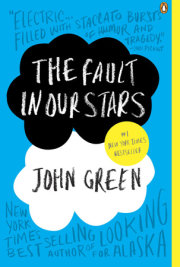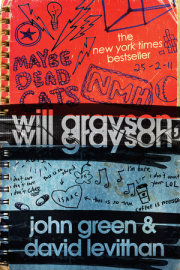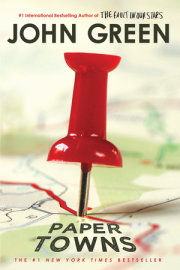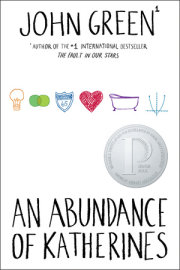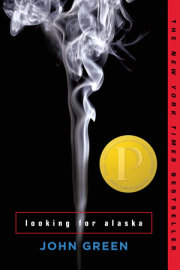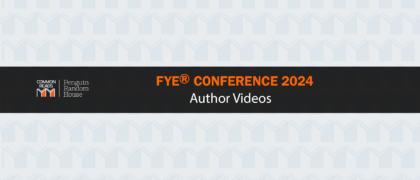ONE
At the time I first realized I might be fictional, my weekdays were spent at a publicly funded institution on the north side of Indianapolis called White River High School, where I was required to eat lunch at a particular time—between 12:37 p.m. and 1:14 p.m.—by forces so much larger than myself that I couldn’t even begin to identify them. If those forces had given me a different lunch period, or if the tablemates who helped author my fate had chosen a different topic of conversation that September day, I would’ve met a different end—or at least a different middle. But I was -beginning to learn that your life is a story told about you, not one that you tell.
Of course, you pretend to be the author. You have to. You think, I now choose to go to lunch, when that monotone beep rings from on high at 12:37. But really, the bell decides. You think you’re the painter, but you’re the canvas.
Hundreds of voices were shouting over one another in the cafeteria, so that the conversation became mere sound, the rushing of a river over rocks. And as I sat beneath fluorescent cylinders spewing aggressively artificial light, I thought about how we all believed ourselves to be the hero of some personal epic, when in fact we were basically identical organisms colonizing a vast and windowless room that smelled of Lysol and lard.
I was eating a peanut butter and honey sandwich and drinking a Dr Pepper. To be honest, I find the whole process of masticating plants and animals and then shoving them down my esophagus kind of disgusting, so I was trying not to think about the fact that I was eating, which is a form of thinking about it.
Across the table from me, Mychal Turner was scribbling in a yellow-paper notebook. Our lunch table was like a long-running play on Broadway: The cast changed over the years, but the roles never did. Mychal was The Artsy One. He was talking with Daisy Ramirez, who’d played the role of my Best and Most Fearless Friend since elementary school, but I couldn’t follow their conversation over the noise of all the others.
What was my part in this play? The Sidekick. I was Daisy’s Friend, or Ms. Holmes’s Daughter. I was somebody’s something.
I felt my stomach begin to work on the sandwich, and even over everybody’s talking, I could hear it digesting, all the bacteria chewing the slime of peanut butter—the students inside of me eating at my internal cafeteria. A shiver convulsed through me.
“Didn’t you go to camp with him?” Daisy asked me.
“With who?”
“Davis Pickett,” she said.
“Yeah,” I said. “Why?”
“Aren’t you listening?” Daisy asked. I am listening, I thought, to the cacophony of my digestive tract. Of course I’d long known that I was playing host to a massive collection of parasitic organisms, but I didn’t much like being reminded of it. By cell count, humans are approximately 50 percent microbial, meaning that about half of the cells that make you up are not yours at all. There are something like a thousand times more microbes living in my particular biome than there are human beings on earth, and it often seems like I can feel them living and breeding and dying in and on me. I wiped my sweaty palms on my jeans and tried to control my breathing. Admittedly, I have some anxiety problems, but I would argue it isn’t irrational to be concerned about the fact that you are a skin-encased bacterial colony.
Mychal said, “His dad was about to be arrested for bribery or something, but the night before the raid he disappeared. There’s a hundred-thousand-dollar reward out for him.”
“And you know his kid,” Daisy said.
“Knew him,” I answered.
I watched Daisy attack her school-provided rectangular pizza and green beans with a fork. She kept glancing up at me, her eyes widening as if to say, Well ? I could tell she wanted me to ask her about something, but I couldn’t tell what, because my stomach wouldn’t shut up, which was forcing me deep inside a worry that I’d somehow contracted a parasitic infection.
I could half hear Mychal telling Daisy about his new art project, in which he was using Photoshop to average the faces of a hundred people named Mychal, and the average of their faces would be this new, one-hundred-and-first Mychal, which was an interesting idea, and I wanted to listen, but the cafeteria was so loud, and I couldn’t stop wondering whether there was something wrong with the microbial balance of power inside me.
Excessive abdominal noise is an uncommon, but not unprecedented, presenting symptom of infection with the bacteria Clostridium difficile, which can be fatal. I pulled out my phone and searched “human microbiome” to reread Wikipedia’s introduction to the trillions of microorganisms currently inside me. I clicked over to the article about C. diff, scrolling to the part about how most C. diff infections occur in hospitals. I scrolled down farther to a list of symptoms, none of which I had, except for the excessive abdominal noises, although I knew from previous searches that the Cleveland Clinic had reported the case of one person who’d died of C. diff after presenting at the hospital with only abdominal pain and fever. I reminded myself that I didn’t have a fever, and my self replied: You don’t have a fever YET.
At the cafeteria, where a shrinking slice of my consciousness still resided, Daisy was telling Mychal that his averaging project shouldn’t be about people named Mychal but about imprisoned men who’d later been exonerated. “It’ll be easier, anyway,” she said, “because they all have mug shots taken from the same angle, and then it’s not just about names but about race and class and mass incarceration,” and Mychal was like, “You’re a genius, Daisy,” and she said, “You sound surprised,” and meanwhile I was thinking that if half the cells inside of you are not you, doesn’t that challenge the whole notion of me as a singular pronoun, let alone as the author of my fate? And I fell pretty far down that recursive wormhole until it transported me completely out of the White River High School cafeteria into some non-sensorial place only properly crazy people get to visit.
Ever since I was little, I’ve pressed my right thumbnail into the finger pad of my middle finger, and so now there’s this weird callus over my fingerprint. After so many years of doing this, I can open up a crack in the skin really easily, so I cover it up with a Band-Aid to try to prevent infection. But sometimes I get worried that there already is an infection, and so I need to drain it, and the only way to do that is to reopen the wound and press out any blood that will come. Once I start thinking about splitting the skin apart, I literally cannot not do it. I apologize for the double negative, but it’s a real double negative of a situation, a bind from which negating the negation is truly the only escape. So anyway, I started to want to feel my thumbnail biting into the skin of my finger pad, and I knew that resistance was more or less futile, so beneath the cafeteria table, I slipped the Band-Aid off my finger and dug my thumbnail into the callused skin until I felt the crack open.
“Holmesy,” Daisy said. I looked up at her. “We’re almost through lunch and you haven’t even mentioned my hair.” She shook out her hair, with so-red-they-were-pink highlights. Right. She’d dyed her hair.
I swum up out of the depths and said, “It’s bold.”
“I know, right? It says, ‘Ladies and gentlemen and also people who do not identify as ladies or gentlemen, Daisy Ramirez won’t break her promises, but she will break your heart.” Daisy’s self-proclaimed life motto was “Break Hearts, Not Promises.” She kept threatening to get it tattooed on her ankle when she turned eighteen. Daisy turned back to Mychal, and I to my thoughts. The stomach grumbling had grown, if anything, louder. I felt like I might vomit. For someone who actively dislikes bodily fluids, I throw up quite a lot.
“Holmesy, you okay?” Daisy asked. I nodded. Sometimes I wondered why she liked me, or at least tolerated me. Why any of them did. Even I found myself annoying.
I could feel sweat sprouting from my forehead, and once I begin to sweat, it’s impossible to stop. I’ll keep sweating for hours, and not just my face or my armpits. My neck sweats. My boobs sweat. My calves sweat. Maybe I did have a fever.
Beneath the table, I slid the old Band-Aid into my pocket and, without looking, pulled out a new one, unwrapped it, and then glanced down to apply it to my finger. All the while, I was breathing in through my nose and out through my mouth, in the manner advised by Dr. Karen Singh, exhaling at a pace “that would make a candle flicker but not go out. Imagine that candle, Aza, flickering from your breath but still there, always there.” So I tried that, but the thought spiral kept tightening anyway. I could hear Dr. Singh saying I shouldn’t get out my phone, that I mustn’t look up the same questions over and over, but I got it out anyway, and reread the “Human Microbiota” Wikipedia article.
The thing about a spiral is, if you follow it inward, it never actually ends. It just keeps tightening, infinitely.
I sealed the Ziploc bag around the last quarter of my sandwich, got up, and tossed it into an overfilled trash can. I heard a voice from behind me. “How concerned should I be that you haven’t said more than two words in a row all day?”
“Thought spiral,” I mumbled in reply. Daisy had known me since we were six, long enough to get it.
“I figured. Sorry, man. Let’s hang out today.”
This girl Molly walked up to us, smiling, and said, “Uh, Daisy, just FYI, your Kool-Aid dye job is staining your shirt.”
Daisy looked down at her shoulders, and indeed, her striped top had turned pink in spots. She flinched for a second, then straightened her spine. “Yeah, it’s part of the look, Molly. Stained shirts are huge in Paris right now.” She turned away from Molly and said, “Right, so we’ll go to your house and watch Star Wars: Rebels.” Daisy was really into Star Wars—and not just the movies, but also the books and the animated shows and the kids’ show where they’re all made out of Lego. Like, she wrote fan fiction about Chewbacca’s love life. “And we will improve your mood until you are able to say three or even four words in a row; sound good?”
“Sounds good.”
“And then you can take me to work. Sorry, but I need a ride.”
“Okay.” I wanted to say more, but the thoughts kept coming, unbidden and unwanted. If I’d been the author, I would’ve stopped thinking about my microbiome. I would’ve told Daisy how much I liked her idea for Mychal’s art project, and I would’ve told her that I did remember Davis Pickett, that I remembered being eleven and carrying a vague but constant fear. I would’ve told her that I remembered once at camp lying next to Davis on the edge of a dock, our legs dangling over, our backs against the rough-hewn planks of wood, staring together up at a cloudless summer sky. I would’ve told her that Davis and I never talked much, or even looked at each other, but it didn’t matter, because we were looking at the same sky together, which is maybe more intimate than eye contact anyway. Anybody can look at you. It’s quite rare to find someone who sees the same world you see.
Copyright © 2017 by John Green. All rights reserved. No part of this excerpt may be reproduced or reprinted without permission in writing from the publisher.


